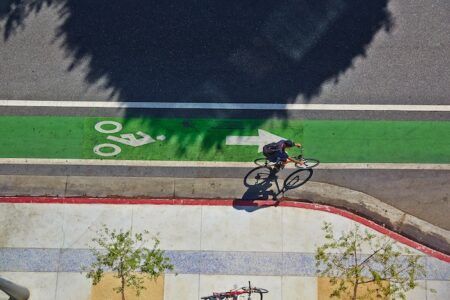The US Department of Transportation’s (USDOT) Federal Transit Administration (FTA) has announced an opportunity to apply for US$8m in federal funding for projects that demonstrate innovative approaches to mobility issues in public transportation.
The program, known as the ‘Mobility on Demand (MOD) Sandbox’, will support research and technology deployments that improve public transportation efficiency and effectiveness, enhancing safety and connectivity in the USA’s transportation system. The Mobility on Demand Sandbox Demonstration Program is part of a larger MOD research effort at the FTA and USDOT that seeks to support transit agencies and communities as they navigate the evolving landscape of personal mobility. MOD projects and services help make transportation systems more integrated, automated, and accessible, while offering better connections to both existing and future infrastructure and public and private transportation options.
Projects funded through the MOD Sandbox could include smartphone apps; innovative fare payment and finance mechanisms; connected vehicles and infrastructure; shared-use and on-demand services; and a broad range of other mobility solutions. And, as public transportation is a lifeline to jobs, education and other opportunities for millions of Americans, it is critical that MOD projects embrace accessibility and equity for all travelers. Existing FTA grantees, such as public transportation agencies, state Departments of Transportation (DOTs), and Native American tribes, are eligible to receive funds under the program, and applicants are encouraged to partner with private and non-profit organizations to deliver their projects, with applications due by July 5.
“Innovation is driving our world forward, and we want public transportation providers to seize opportunities to embrace new ideas and solutions,” said US Transportation Secretary Anthony Foxx. “Technology is a powerful tool for bringing people together like never before, to connect communities in ways that build and increase opportunity.”
The FTA’s Acting Administrator, Carolyn Flowers (pictured), added, “We are excited to see the creativity that communities nationwide will use to enhance ways to improve mobility. We believe the latest in research and technology can help improve access and mobility for all.”
Foxx has also announced the ‘Every Place Counts Design Challenge’, which aims to raise awareness about existing transportation infrastructure barriers, and identify innovative solutions to reconnect communities to jobs, healthcare, education, and other essential services. The Challenge will bring together mayors and tribal leaders, working with designers, architects, engineering and planning experts to compete to receive on-site technical assistance with transportation planning and conceptual design from experts in the field.
The Challenge builds on Foxx’s efforts to highlight the long-lasting impacts of transportation decisions on communities across the USA. Last month, he launched a national dialogue on the legacy of transportation infrastructure projects that divided neighborhoods, cut off residents from economic centers, and left communities with limited transportation and mobility options.
“This Challenge asks communities to reimagine how they can be better connected, and empowers them to design innovative transportation projects that serve everyone that lives there,” explained Foxx. “We are excited to work with thought leaders who share our focus on designing a 21st century transportation network that is built by, for and with the communities impacted by them.”




